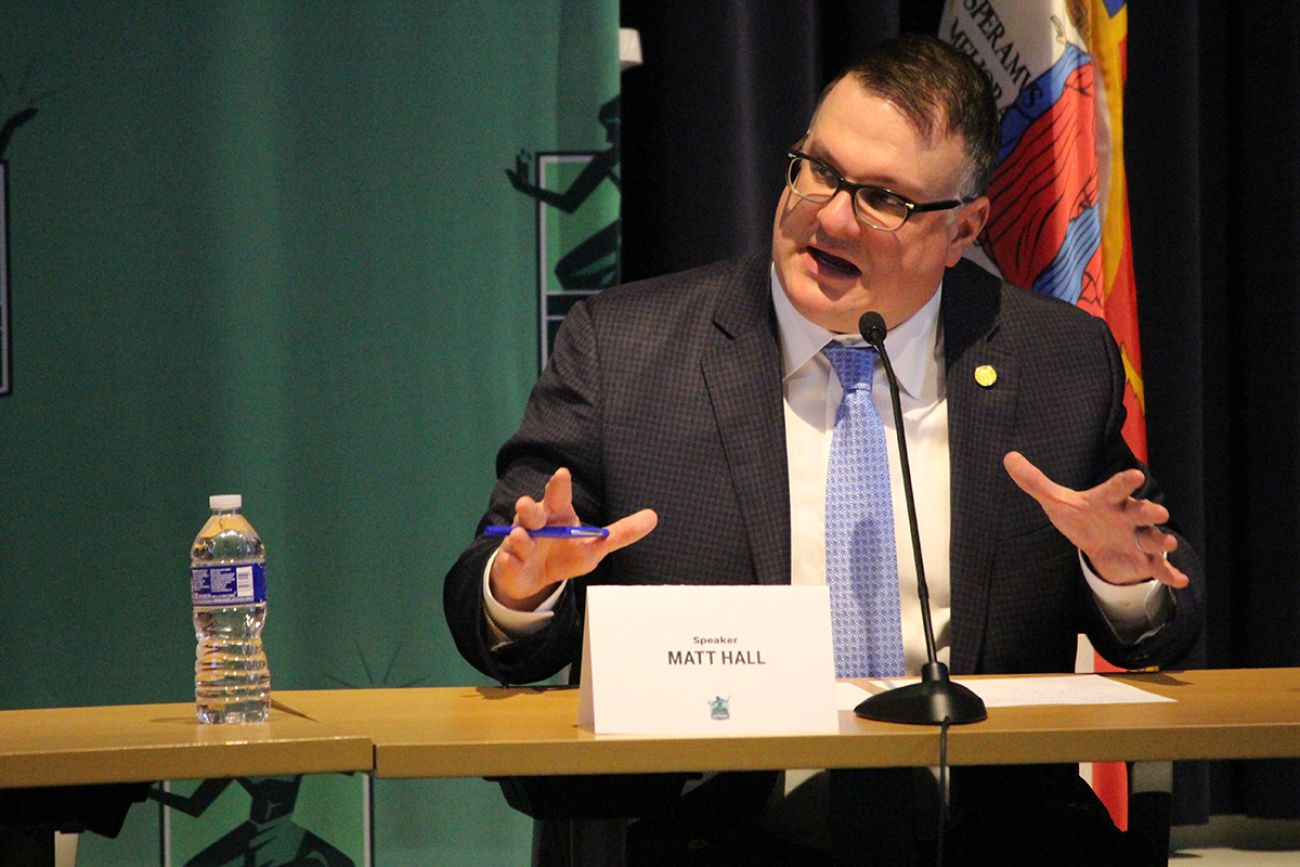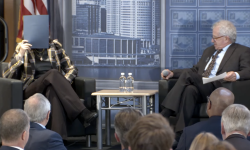Fact check: Gretchen Whitmer warns 'funding cliff’ coming for Michigan roads

- Gov. Gretchen Whitmer spoke to members of the Detroit Economic Club Monday, calling for a “sustainable, long-term solution” to road funding
- As part of those remarks, she also made numerous claims about House Republicans’ road plans and the state of Michigan’s roads
- The bulk of those claims are true, with Michigan on its way to having over half of its roads in poor condition by 2035, per state projections
DETROIT — Michigan’s roads are crumbling and lawmakers must move quickly to avoid a “funding cliff” when her bond plan ends, Gov. Gretchen Whitmer said Monday, predicting that absent a “sustainable, long-term solution” the state will be back in the same position in a few years.
“Sure, we could talk about how our unique freeze-thaw cycle, our trucking standards, how they impact our roads,” Whitmer said in an address to members of the Detroit Economic Club. “But, what it really comes down to is that, for too long, we have taken inadequate bites out of the road problem.”
Roads, tariffs and manufacturing were the focus of her nearly half-hour remarks, which came days after a White House meeting on similar topics with President Donald Trump and House Speaker Matt Hall, R-Richland Township.
Whitmer and Hall are the only two officials with serious plans to address Michigan’s roads infrastructure — hers would raise business taxes, while his would redirect other spending — something the governor noted Monday.
“We've been having productive conversations in Lansing for months now, and I'm confident that we're going to reach a fair and necessarily bipartisan deal soon,” Whitmer said.

But she also criticized portions of Hall’s plan, claiming it would mean less money for critical services and suggesting that a growing number of Michigan roads will fall into “poor condition” without action.
Here are the facts.
Hot takes on Hall plan
Whitmer said she had three major concerns with Hall’s plan, claiming it would take money away from police and firefighters, housing revitalization and economic development efforts.
“While we don’t have the luxury of solving one problem at a time,” Whitmer said, “we must protect public safety, build more housing, create good jobs and fix the roads, all at the same time. No false choices.”
Hall’s office did not immediately respond to a request for comment.
The plan approved last month by the Republican-led House would put more than $3 billion a year into road repairs but would, as Whitmer claimed, cut a key economic development program and force spending cuts in other areas.
As part of that effort, the nine-bill House GOP plan would:
- Replace the 6% sales tax on gasoline with a revenue-neutral 20-cent-per-gallon increase in the motor fuel tax, which would be used to fund roads and equals about $1 billion per year
- Earmark $2 billion a year from the current 6% Corporate Income Tax to roads, with 90% going to local agencies. It would grow to $2.2 billion after 2030
- End $550 million a year in funding for the Strategic Outreach Attraction Reserve Fund, a key economic development program Whitmer has touted but Republicans have criticized
- Push businesses off of Michigan Economic Growth Authority tax credits by increasing the rate they’d pay under an old business tax to 30%
Whitmer is right that the plan would cut funding for business incentives.
But contrary to Whitmer’s remarks, House lawmakers adopted a measure to maintain funding for the state’s Housing and Community Development Fund prior to the package’s passage in March.
Related:
- Gretchen Whitmer: I shouldn’t have hid my face in White House visit
- Mike Rogers runs again for US Senate in Michigan, vowing to ‘stand with’ Trump
- Trump praises Whitmer, vows to ramp up Asian Carp fight to 'save Lake Michigan'
- 70 international students face deportation in Michigan. Trump won't say why
As for public safety funding, the plan does not explicitly target police and fire services. The nonpartisan House Fiscal Agency does note, however, the proposal would generate about $3.2 billion in roads funding — while also decreasing the state’s general fund by around $3.2 billion in annual funding.
This could force lawmakers to consider cutting spending elsewhere in the state’s budget. House Republicans haven’t specified those cuts but have told reporters that “nothing essential is going to get cut.”
The state of the state’s roads
Whitmer claimed Monday that just two Michigan counties have half of their roads rated in "good condition," with even worse ratings in Wayne County — where she spoke — and several other areas.
While county-by-county data is not immediately available, Whitmer's claims appear relatively consistent with statewide ratings.
The state’s Transportation Asset Management Council’s 2023 annual Roads and Bridges Report noted that of the more than 41,600 lane miles for local roads rated in 2022 and 2023, 47% were in “poor” condition, a 2% jump from when last measured across 2021 and 2022.
By comparison, 33% of state roads (primarily highways) were rated in poor condition. The council projected that rate to grow to 52% by 2035.
“Without additional and consistent long-term investment, the percentage of roads in poor condition will continue to increase” as construction costs outpace the ability to fix them,” the report concluded.
A sustainable plan
In her push for a sustained funding source, Whitmer said Michigan is “going to fall off the funding cliff” when the state runs out of funding – likely this year — from her $3.5 billion bonding program adopted in 2020. “We’ve got to have a solution.”
That bonding, like other road fixes before it, came about after a stalemate. Whitmer had proposed a 45-cent gas tax hike to fix the state’s roads but that plan went nowhere in a GOP-led Legislature.
The state spent most of the bond revenue between 2020 and 2023 and is expected to issue its last $700 million bond offer this year. Those projects — almost all for highways — are now wrapping up. Some local governments are also running out of federal stimulus money they had used to fund repairs.
To combat that future, Whitmer is now pitching a $3 billion roads plan built on the backs of new taxes on corporations and marijuana.
The plan, her office claims, will “make sure that corporations pay their fair share to do business in Michigan” and raise $1.7 billion a year from them “without putting the costs on the backs of everyday Michiganders.”
The governor has not specified details, however, or said whether she wants to raise the Corporate Income Tax, which her office says will be a point of negotiation with the Michigan Legislature.
Michigan's current year transportation budget — which includes funding for more than just roads — totalled about $6.8 billion, up from $4.3 billion the year before Whitmer took office.
The size of the overall state budget has grown considerably too, and Republicans contend it is possible to fix the roads without raising taxes.
See what new members are saying about why they donated to Bridge Michigan:
- “In order for this information to be accurate and unbiased it must be underwritten by its readers, not by special interests.” - Larry S.
- “Not many other media sources report on the topics Bridge does.” - Susan B.
- “Your journalism is outstanding and rare these days.” - Mark S.
If you want to ensure the future of nonpartisan, nonprofit Michigan journalism, please become a member today. You, too, will be asked why you donated and maybe we'll feature your quote next time!




